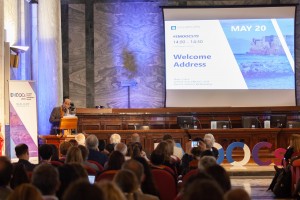UNIR participates in eMOOC2019
Last week I attended the eMOOC2019 conference in Naples, an international event gathering the major global MOOCs providers such as Coursera, edX and FutureLearn, aiming to advance the international debate on MOOCs and online learning in general.
My main takeaway is that MOOC as a concept is evolving, and not towards an open future, for at least two reasons.
First, despite the rhetoric put forward by the major global MOOCs providers, who still speak of “MOOC revolution” and of “MOOCs transforming access to education”, the feeling is that MOOCs are losing their first O (the one of Open). The new “usage models” adopted by the main international providers tend in fact to restrict the open and free use of their MOOCs resources in different ways. Let alone that MOOCs content are very rarely released as OERs, we have been getting used to MOOCs whose content is available only when the course is actually running, and now we have to face the fact that once we subscribe to a course we have access to its content only for a limited period of time. The first one to introduce a paywall for graded assignments was the for-profit platform Coursera in 2015, then joined by FutureLearn in 2017, which further restricted free access to course materials to 14 days after the end of the course. The latest to join the group is the non-profit platform EdX, whose course materials will not be freely accessible after the end of the course, starting from early 2019 (source: Class Central).
Second, as demonstrated by the micro credentials hype coupled with the massive entrance in the MOOC market by the Australian recruitment company SEEK (who invested some 50M$ in FutureLearn and more than 100M$ in Coursera), MOOCs are transforming into “off the shelf skills development courses” with a clear employability target. As Mark Brown noted in the OpenupEd Trend Report on MOOCs, the recent wave of MOOCs is moving toward MOOCs for credit and Continuing Professional Development. The new hot topic are micro-credentials: professional short degrees that pile up single MOOCs or online university courses to form a short and consistent series on a specific topic. Not surprisingly, opportunities and limitations associated to such resources targeting professionals and other medium-high skilled workers were discussed, during the eMOOC2019 conference, in three parallel sessions and one plenary round table.
Gone are the days of the MOOCs revolution in a lifelong and informal learning sense. We know MOOCs started as a phenomenon connected to Open Education, and many of us have witnessed the turn that this kind of online courses have taken from the first open and connectivist experiences (of Downes and Siemens, among others) towards more content-based and structured courses with an increasing employability and market value, but “clockwork MOOCs” are not easy to digest.
On the positive side, the eMOOCs conference also showed some more open approaches to MOOCs, such as the one by Federica.eu, the MOOCs platform of the hosting organisation Università Federico II of Naples, or the Open Knowledge POLIMI which provides all video lectures freely available on their dedicated Youtube channel. It is possibly in these national experience where we can still find some of the original breadth of MOOCS. For the rest, quoting the inspiring presentation of Monty King on postcolonial aspects of MOOCS: “the empire MOOCs back”.
By Dr. Fabio Nascimbeni
Senior Researcher
UNIR iTED

